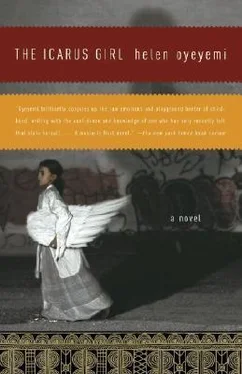Jess had raised her eyebrows at him in surprise.
What a silly question. As if she ever wanted to go to school.
And now they were asking her, giving her a choice: School, yes or no? Yet she felt confused, because she somehow knew by the way that her father was looking at her, his eyes cautious behind his spectacles, that although he had been arguing with her mother about whether she should go to school or not, he would like her to be brave, to be completely recovered, to be a normal child who wanted to see her friends at school. And her mother wanted her to go, simply, Jess supposed, for the sake of going, and rules, and being there if the school was open and nothing was wrong with you.
They were offering her a choice, a chance to say “no,” when if she did, one would be angry and the other disappointed. Was it really, actually, a choice?
With a small, almost unnoticeable movement, her eyes flicked helplessly from one face to the other.
“Yeah,” she said finally, and was rewarded with smiles from both.
Ever since they had returned to England, Jess had been looking out of windows for extended periods of time, sailing eagerly towards the front door whenever there was a knock or the door-bell rang. She spent hours painstakingly braiding a special friendship bracelet for TillyTilly in the tiniest sections possible, then unpicked it and began again because the colours were all wrong. The atmosphere of tense, coiled-up waiting in her had confused her parents, whom she had caught several times gazing bemusedly at each other.
Then, after this period of absorption (with. . what, exactly? friendship bracelets? expectancy? impossible to tell) came the inevitable fever, the whites of her eyes tinged pink, her head lolling dejectedly on her pillow, her fingers limp as if the bones in them had evaporated. She mumbled, made small sounds, like singing noises, broken songs, because when she was ill she could never speak properly.
Jess’s parents had, thankfully in her opinion, given up carrying Jess to the GP whenever she ran such a high temperature. Her GP, Dr. Collins, was as baffled as they were. Jess had already undergone extensive tests: for allergies and anaemia, of all things. They all proved inconclusive because nothing, he explained looking at this little girl who was pulling weakly at her clothes because she was hot, and trembling violently because she was cold, was physically wrong with her.
Jess invariably got over it. Her mother made her eat pepe soup with digestible specks of ground beef in it, and her English grandmother insisted she sup chicken soup with barley, and she began to sleep properly again and totter about to get things she wanted when her mother, absorbed at the computer in her study a few doors away, didn’t immediately answer her calls. She would sway when she got out of her bed, fizzing, coloured dots dancing before her eyes as she wobbled across the floor, zigagging like a baby learning to toddle.
Then she recovered (and still no TillyTilly!) only two days before school started again.
When she finally arrived in the classroom, the rest of Year Five was listening to Miss Patel reading a passage about Sir Francis Drake’s travels from a thin hardback book with a bright picture of his ship, the Golden Hind , on the front. Colleen McLain and Andrea Carney looked at her and whispered behind their hands to each other. Colleen McLain was very clever; she always finished her work faster than everyone else and would sit straight in her chair, her arm waving rhythmically in the air: “ Miiiiiiiiiiiiiss. Miiiiiiiiiiiss .”
She had reddish brown hair in a long bob, and often, when strands of her hair came loose from where she had tucked them behind her ears (she never wore her hair in a ponytail or braid), instead of pushing them back, she would chew the ends, leaving the strands darker, wet and coated with pale globules of saliva.
Jess thought it was disgusting.
Colleen thought Jess was disgusting, although it was never clear why. It was a different thing every day. Mostly, when Jess didn’t want to talk about her ideas in class, Colleen thought that Jess was showing off, making sure that she would be coaxed and pleaded with, but how could Jess have explained in a coherent way that she was scared? Once you let people know anything about what you think, that’s it, you’re dead. Then they’ll be jumping about in your mind, taking things out, holding them up to the light and killing them, yes, killing them, because thoughts are supposed to stay and grow in quiet, dark places, like butterflies in cocoons.
There was no way that anyone was ever going to get into her mind. Not ever. Fine, she’d do the work, yes, fine. Fine, she’d sit with a straight back and crossed legs, smiling so hard her cheeks hurt: Who can sit up the straightest? Me, me, me! Yes, she could do all that, but after that, something in her said: They should leave me alone and let me read my books, let me think my thoughts. If they pushed her too far with their requests for her to open up, interact more, make friends, she would scream. They knew it. She’d done it before.
Despite the
(disgusting)
chewed hair, Colleen was friends with everyone in the class, even though some would quarrel with her when she got too bossy, which was often. She wouldn’t get bossy in an outright way, but she would force people to see things from her perspective through a simple tool: scorn.
“Oh my Lord,” she’d say, looking to heaven as if God was nodding in silent agreement with her, “you’re not really going to do that, are you?”
And Andrea Carney would titter disdainfully somewhere behind Colleen’s left shoulder, or maybe, for variety, her right.
If some hapless child organised the class at playtime for a game of Bulldog on the rare occasion the biggest playing space in the Juniors’ playground could be wrested from the Year Six basketball boys, they would look at her in alarm. If Colleen didn’t play, then Andrea wouldn’t play, and if Andrea didn’t play, then Sonia, who was Andrea’s cousin, wouldn’t play, and if Sonia wouldn’t play, then Alison Carr, the prettiest girl in the class, wouldn’t play. . and so on. Tunde Coker and Samantha Robinson, two people who always tried to get the class together and make peace between warring factions, were the ones who most often fell victim to Colleen McLain’s sarcasm.
Sometimes they would rebel — Samantha had pulled Colleen’s hair after school one day and scratched Andrea when she had tried to come to her best friend’s defence — but mostly they would sigh and give in, because “Colleen’s all right really.”
Jess, who saw everything but participated in nothing, observed Colleen’s little attacks to secure her permanent leadership, and felt most sorry for Tunde Coker. He actually made an effort to talk to Jess whenever he saw her, bravely struggling to revive a conversation that died almost before it started. Jess would feel like turning away in despair, unable to explain that she just couldn’t say anything worthwhile when other people were talking to her, but also unable to say anything friendly to dispel the feeling Tunde jokingly expressed that she “didn’t like him much.”
Jess liked Tunde Coker quite a lot — the habit he had of digging his hands so deep into the pockets of his tracksuit trousers that it looked as if he had two hand-sized bumps growing out of the sides of his legs; the long, slow, lopsided smile that he smiled when someone said or did something funny. He rarely laughed, but he also never seemed to take conversation seriously, was constantly smiling as if words washed over him like an impure tide of meaning, searching instead the face of the person he was talking to with his eyes. Yes, she really did like him quite a lot, although she knew that he, much like any other boy in their class, would do anything the blond, dimpled Alison Carr asked.
Читать дальше












